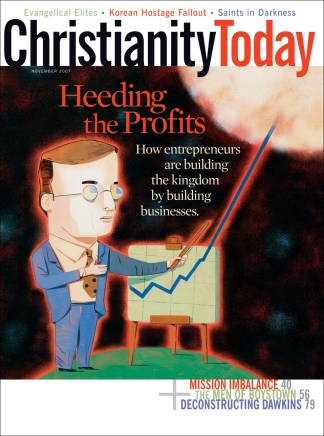As Oxford professor and arch-evangelist of atheism Richard Dawkins continues his crusade against religion, we finally have the first book-length critique of The God Delusion: Alister McGrath and Joanna Collicutt McGrath’s The Dawkins Delusion?: Atheist Fundamentalism and the Denial of the Divine (InterVarsity Press).
One could hardly think of a more contrasting figure to Dawkins or a better apologist for theism than Alister McGrath. This atheist-turned-Christian, also of Oxford, is a professor of historical theology. But as a student of molecular biophysics, he possesses the dual credibility in science and religion that Dawkins lacks. Further, McGrath authored Dawkins’ God: Genes, Memes, and the Meaning of Life in 2004, and is thus thoroughly familiar with Dawkins’s other writings. This is especially helpful for calling Dawkins to consistency.
For example, Dawkins’s central argument is that God’s existence cannot explain the world because he must be at least as complex, and therefore as improbable, as the world itself; and such an improbable entity would also require explanation. Recalling Dawkins’s earlier work Climbing Mount Improbable, McGrath notes Dawkins’s admission that humanity’s existence itself is overwhelmingly improbable. But of course we exist. “We may be highly improbable—yet we are here,” writes McGrath. “The issue, then, is not whether God is probable but whether he is actual.”
Although McGrath’s response is provocative, it is precisely at such points in The Dawkins Delusion? that one wishes McGrath had plumbed the depth of Dawkins’s philosophical naïveté. In asserting that God is improbable, the zoologist is out of his habitat. Probability theorists have developed complex equations to tackle exactly this sort of problem.
Suffice it to say that if Dawkins’s argument (i.e., God’s existence cannot account for the design of the world because his existence is improbable) is correct, God’s trial is over before it begins. In other words, Dawkins does not have to counter specific empirical evidence for purposeful design.
Dawkins next proposes that evolution shaped human brains to believe religious hypotheses (even though religion is itself not evolutionarily beneficial). McGrath is at his finest here, observing that while Dawkins is a scientist writing about religion, he fails to study religion scientifically. In fact, Dawkins does not even offer a rigorous definition of religion.
Like watching one schoolboy do another’s work, McGrath’s true gift is pointing out what Dawkins is obliged to show in order to make his case. Different propositions are, unsurprisingly, processed differently by the brain. So if Dawkins is to proffer religious belief as a byproduct of our evolution, it is incumbent on him to tell us what category religious statements belong to, what other sorts of statements religious thoughts may piggyback on, and how the brain processes them—none of which Dawkins seems aware he should provide.
As McGrath rightly points out, “There is nothing specific to religion here.” All of our thoughts (including atheistic thoughts) are brain-dependent. What is worse, Dawkins presupposes a reductionist approach in which mental states have a one-way relationship from the physical brain rather than a more complex approach in which mental states—depression is McGrath’s example—have a multiplicity of causes, both physical and social. And McGrath can’t resist noting that while love has physical correlates in the brain, this should not be taken to prove that one’s beloved does not exist!
Finally, concerning religious beliefs—where Dawkins paints in broad strokes—McGrath admirably delves into their complexity and diversity. It may make a nice sound bite to lump Christian evangelicals with Islamic extremists. But to develop a serious scientific critique of religion, one must discuss pertinent differences in theology. And McGrath finds Dawkins’s knowledge of Jesus of Nazareth, the roots of religious violence, and the Bible (e.g., Dawkins asserts without qualification that Paul wrote Hebrews) seriously wanting.
The Dawkins Delusion? is a deliberately short work not intended to fight Dawkins on all fronts. Even so, it is odd that McGrath does not attempt to counter Dawkins on neo-Darwinism, for this is Dawkins’s whole cachet. As Dawkins put it, “Darwin made it possible to be an intellectually fulfilled atheist.” Thus, any critique of Dawkins’s atheism without tackling its Darwinian foundation is bound to leave the reader unsatisfied.
McGrath does not attack Darwinism because he views it as equally compatible with both theism and atheism. Either interpretation is legitimate, he says. McGrath cites as a witness atheist-Darwinist Stephen Jay Gould, who noted that half his Darwinist colleagues believed in God, and half did not. Therefore, thought Gould, Darwinism must be compatible with both worldviews, or half of his colleagues must be “stupid.” But of course this would not make half of them stupid; it would just make half wrong. McGrath recounts surveys showing many scientists to be theists. Unfortunately, this does nothing to establish the compatibility of Darwinism and theism. Humans hold incompatible beliefs all the time.
To see why Darwinism and theism are incompatible, consider random mutations and natural selection—the two elements of modern Darwinian theory. Random mutations are, well, random. By definition, random mutations are unguided. “Mutations are simply errors in DNA replication,” according to University of Chicago biologist Jerry Coyne. “The chance of a mutation happening is indifferent to whether it would be helpful or harmful.” If a mutation is harmful, the organism with the mutation will leave fewer offspring; but if the mutation is beneficial for reproduction, the mutated gene will be passed to many offspring. This is the “natural” selection part. Theistic Darwinists claim that this process creates life’s diversity and is also “used” by God.
While theists can have a variety of legitimate views on life’s evolution, surely they must maintain that the process involves intelligence. So the question is: Can an intelligent being use random mutations and natural selection to create? No. This is not a theological problem; it is a logical one. The words random and natural are meant to exclude intelligence. If God guides which mutations happen, the mutations are not random; if God chooses which organisms survive so as to guide life’s evolution, the selection is intelligent rather than natural.
Theistic Darwinists maintain that God was “intimately involved” in creation, to use Francis Collins’s words. But they also think life developed via genuinely random mutations and genuinely natural selection. Yet they never explain what God is doing in this process. Perhaps there is still room for him to start the whole thing off, but this abandons theism for deism.
So there is a danger in the approach of theistic Darwinists such as McGrath. He is surely right that the religious and scientific worldviews are compatible. Harmony can be found. But this is not because theism can concede a materialist origin story and escape unscathed. Rather, it is because the materialist story is false and, further, is contradicted by mounting physical evidence in physics, chemistry, and biology.
McGrath is, if anything, too generous with Dawkins. The Dawkins Delusion? is written with a scholarly care and graciousness that Dawkins lacks. Dawkins’s arrogance and contempt lead him to be sloppy with his opponents’ arguments. McGrath, despite his flaws, takes Dawkins seriously.
Logan Paul Gage, policy analyst, Discovery Institute.
Copyright © 2007 Christianity Today. Click for reprint information.
Related Elsewhere:
The Dawkins Delusion? is available from ChristianBook.com and other retailers.
Previous articles about atheism and Dawkins’ work include:
Puncturing Atheism | Fourfold God Squad brilliantly takes on Dawkins, Hitchens, & Co. (October 31, 2007)
The New Intolerance | Fear mongering among elite atheists is not a pretty sight. A Christianity Today editorial (January 25, 2007)
The Dawkins Confusion | Naturalism ad absurdum. (March/April 2007)
The Know-Nothing Party | How should Christians respond to ill-informed attacks? (February 5, 2007)
Clockwork Origins, parts 1, 2, and 3 | Richard Dawkins is absolutely confident that science will finally accomplish what philosophy has been unable to do in more than 2,000 years—make theism intellectually indefensible. (Jan/Feb 1996)
Alister McGrath participated in a Christianity Today discussion about the state of the evangelical mind.










